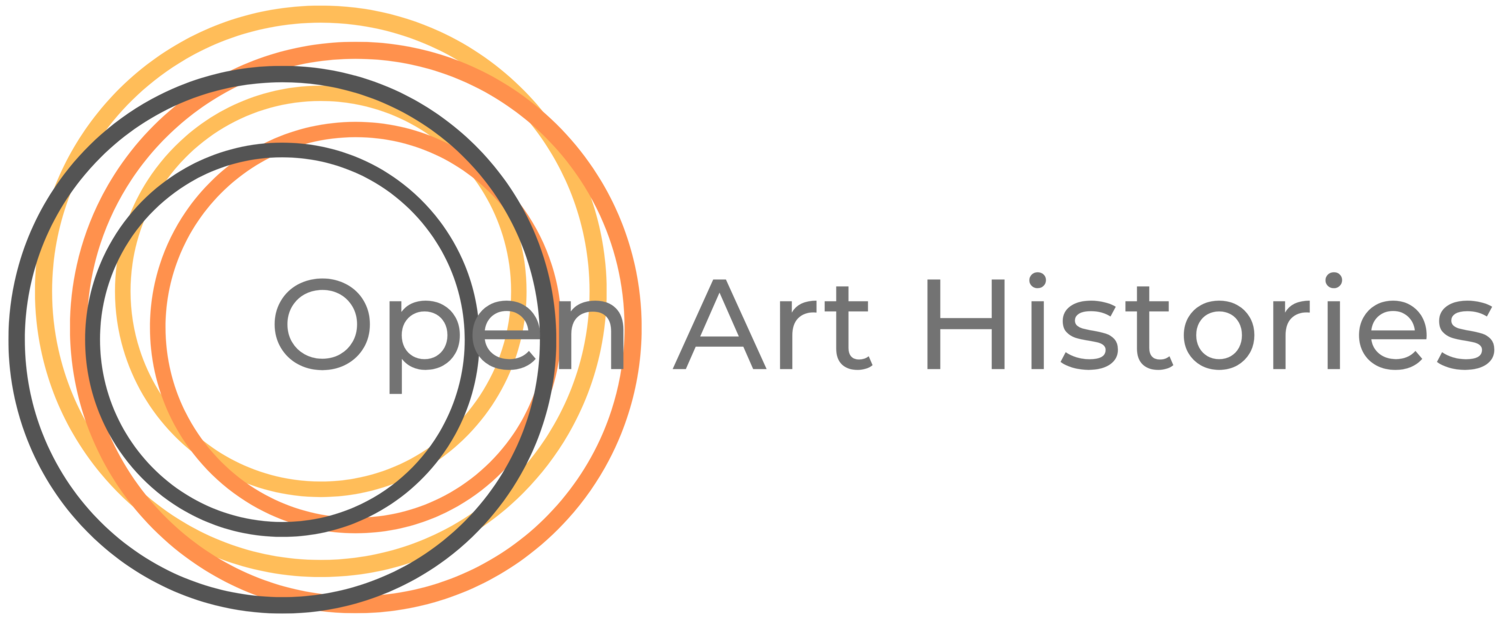INVITED SPEAKER: Three Views on Open Educational Resources
Are you interested in what ArtxHistory.org founder Natalie Coletta describes as “rejecting the dominant language and scholarship that create a climate of elitism and exclusivity” in art history? Are you curious about using open educational resources (OERs) to do so? This afternoon session of talks brought together three art historians leading the development of open access teaching materials that seek to challenge traditional textbook conventions. Leah Clark discusses how Open Arts Objects, an open access platform providing free films inspires diverse audiences to understand art and visual culture while leading change in museum educational programmes and professional practice and increasing public awareness about a global approach to art history. Natalie Coletta founded the ArtxHistory portal as a means to decolonize academia, while serving students and teachers and addressing challenging topics in the areas of artistic practice, history, and critique of 20th and 21st century art. Smarthistory’s Dean of Content and Strategy, Lauren Kilroy-Ewbank spoke about how the resource’s free, award-winning digital content unlocks the expertise of hundreds of leading scholars making the history of art accessible and engaging to more people around the world.
Check out the session recording:
And the slides too:
Leah Clark, The Open University, Open Arts Objects is project lead on Open Arts Objects, an innovative project that provides free open-access films and teaching support materials geared to the new A-level in Art History. She appears in over 10 films on topics ranging from Chinese porcelain collections in Renaissance Italy to “critical terms for Art History” on hybridity and globalisation. Open Arts Objects was shortlisted for a Times Higher Education Award in the category of Knowledge Exchange/Transfer Initiative of the Year for 2019. Dr. Clark was also runner up for the Open University’s Research Excellence Awards: Outstanding Impact of Research on Society and Prosperity in 2019. In June of the same year, her research was showcased in one of 15 interactive exhibits at the British Academy Summer showcase festival for curious minds, “What can Italian Renaissance art tell us about global trade?” which led to an interview on BBC 3 counties radio and an article for The Conversation.
Natalie Coletta, Community College of Rhode Island, ArtxHistory is a professor of Art History at the Community College of Rhode Island, where she has been teaching since 1994, Natalie Coletta has been committed to the support and development of affordable, inclusive, open-door education throughout her career. Prof. Coletta believes strongly in the importance of creating a just and dynamic learning experience for students in the foundational years of their college education: it's the early years that shape the foundation of our thinking. The intention of an inclusive classroom was defined early in Prof. Coletta's pedagogy, particularly through the mentorship of feminist practitioners Natalie Boymel Kampen and Wendy Wassyng Roworth, with whom Prof. Coletta studied at the University of Rhode Island in the 1980s. A two-year directorship at Hampden Gallery during her MA studies in American Art at the University of Massachusetts, Amherst, was seminal in developing Coletta's theory and practice around the gallery as a critique of culture and curriculum.
Lauren Kilroy-Ewbank, SmartHistory is the Dean of Content and Strategy at Smarthistory, and a longtime content editor and author for Smarthistory. At Smarthistory, she works to make art history engaging, accessible, and free to as many people as possible—and to do it responsibly. She has initiated several projects, including the successful “Expanding the Renaissance Initiative” that seeks to open up new pathways to understanding art between c. 1300–1650 across the world. Her research focuses on religious art in the Spanish Americas and Iberia, emotions, women in art, and digital art history. She has won several teaching awards and grants to support innovative digital teaching initiatives involving virtual reality, digital platforms and software, and more. Prior to joining Smarthistory full time she was a tenured Associate Professor of Art History at Pepperdine University, and assistant professor at Brooklyn College, CUNY and the Graduate Center, CUNY.
LIST OF WEBLINKS FROM PRESENTATION AND DISCUSSION
Native Land - a resource for North Americans (and others) to find out more about local Indigenous territories and languages https://native-land.ca/territory-acknowledgement/
Brian Arao Kristi Clemens, “From Safe Spaces to Brave Spaces” : https://tlss.uottawa.ca/site/perspective-autochtone/1d-_From-Safe-Spaces-to-Brave-Spaces.pdf
Hewlett Foundation, Open Educational Resources: https://hewlett.org/strategy/open-education/
Open Education Week https://www.openeducationweek.org
Open Art Histories Archive https://openarthistories.ca/oah-archive
knightlab - provides an open, collaborative environment for interdisciplinary exploration and conversation, where students and professionals learn together and from one another https://knightlab.northwestern.edu/projects/
Smarthistory commons - supporting public art history with collaborative working methods https://smarthistory.org/commons/
Make your own Open Arts Objects film! http://www.open.ac.uk/blogs/openartsextra/make-your-own-open-arts-objects-film/



